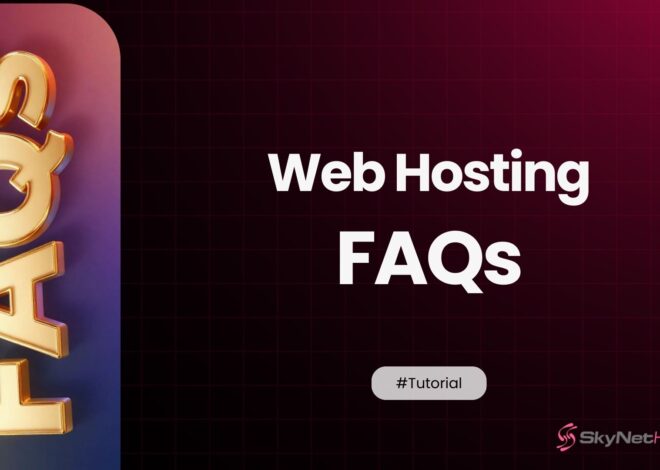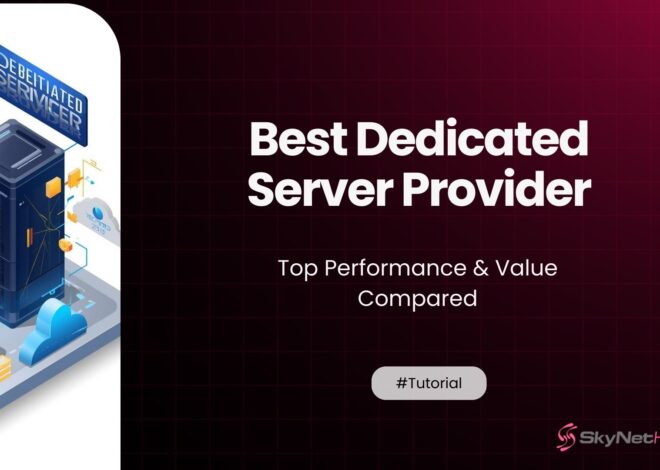![Black and Green Gradient Minimalist Professional Business Presentation 4 What is reseller Hosting – The ultimate guide [2025]](https://skynethosting.net/blog/wp-content/uploads/2025/05/Black-and-Green-Gradient-Minimalist-Professional-Business-Presentation-4.png)
What is reseller Hosting – The ultimate guide [2025]
TL;DR
- Reseller hosting lets you rent server space from a provider and resell it under your own brand, making it a low-cost way to start a hosting business without managing servers.
- The model combines the simplicity of shared hosting with the profit potential of business ownership, using tools like WHM, cPanel, and WHMCS for account and billing management.
- Its business appeal lies in low startup costs, steady recurring revenue, brand control, upselling opportunities, and easy scalability as client bases grow.
- Modern white-label solutions enable full branding, while cloud and VPS-backed reseller hosting enhance performance, control, and reliability.
- Common challenges—like limited server control and dependency on providers—can be managed by choosing a trusted host with uptime guarantees and strong 24/7 support.
- SkyNetHosting.net emerges as a leader with free WHMCS licenses, flexible upgrades, NVMe SSD servers, white-label branding, and affordable reseller plans built for entrepreneurs.
Reseller hosting has emerged as a lucrative opportunity in today’s competitive web hosting industry. With the demand for personalized and scalable hosting solutions growing rapidly, learning how to start a reseller hosting business has become a practical way for web developers, freelancers, and entrepreneurs to earn recurring revenue.
But how does reseller hosting work? Is it the right hosting business model for you? This comprehensive guide will answer these questions and walk you through everything you need to know about reseller hosting from the basics to advanced strategies for scaling your business.
SkyNetHosting.net is a trusted name in the web hosting industry, known for its reliable and feature-rich reseller hosting solutions. By the end of this guide, you’ll have a complete A-to-Z understanding of reseller hosting, empowering you to build and grow your own hosting business with confidence.
What Is Reseller Hosting?
Reseller hosting is a type of web hosting where a primary hosting provider allows an individual or business (the reseller) to rent out server space and services to their own clients under their brand. Essentially, the reseller acts as a middleman, offering web hosting plans without having to manage the underlying infrastructure directly. This makes it an ideal way to start a hosting business with minimal overhead.
How Reseller Hosting Differs from Other Web Hosting Types
To understand the unique value of reseller hosting, let’s see how it compares to other common web hosting types:
- Shared Hosting: Shared hosting customers share server resources with many other users. It’s simple, affordable, and managed directly by the hosting provider, which limits customization.
- VPS Hosting: Virtual Private Servers (VPS) offer dedicated resources on a shared physical infrastructure. It’s more flexible and technical than shared hosting but requires some server management expertise.
- Dedicated Hosting: Provides a dedicated physical server exclusively for one client, offering full control and customization at a higher price point.
- Reseller Hosting: Combines the simplicity of shared hosting with the potential for recurring revenue. Resellers don’t need to manage physical servers but can create and manage hosting accounts for their clients, essentially allowing them to operate their own web hosting business.
The Evolution of Reseller Hosting in the Web Hosting Ecosystem
Reseller hosting has evolved significantly, adapting to the changing needs of web hosting providers and users. Initially, it allowed individuals or small businesses to sell hosting services without owning physical servers. Over time, advancements in technology and rising competition have introduced better tools, automation, and scalability to reseller hosting packages.
Modern solutions now include white-label branding, letting resellers market services under their own name. Enhanced control panels like WHM (Web Host Manager) and billing tools like WHMCS (Web Host Manager Complete Solution) simplify account management.
The rise of cloud computing has also improved reliability and scalability compared to traditional shared hosting. Reseller hosting is no longer just a way to supplement income; it’s now a key part of the web hosting ecosystem, empowering individuals, agencies, and businesses to offer tailored services for niche markets while leveraging new hosting technologies.
Traditional Reseller Hosting vs. White Label Hosting
Understanding the distinction here is crucial for your brand:
- Traditional Reseller Hosting: Requires branding under the main hosting company’s name.
- White Label Hosting: On the other hand, white label hosting allows you to resell services under your own brand, offering a professional look and feel for your customers while maintaining full control over pricing and service delivery. This is often the preferred choice for those looking to build a strong, independent hosting business.
How Reseller Hosting Works: The Technical Foundation
To understand how reseller hosting works, it’s essential to grasp its technical foundation. Here’s a simplified breakdown:
1. Server Architecture
Server architecture in reseller hosting refers to the underlying setup that determines how server resources are distributed and managed.
A reseller hosting plan provides access to essential server resources like disk space, bandwidth, CPU power, and RAM, which the reseller can divide and allocate to multiple individual accounts for their clients.
- Shared Server Architecture: Most reseller hosting plans operate on shared servers, where multiple resellers and users share the same physical server. This setup is cost-efficient, making it an attractive option for small to medium-sized resellers looking to start a hosting business. However, since resources are shared, performance can sometimes be impacted by the activities of other users on the server.
- VPS-Backed Reseller Hosting: For resellers seeking better performance and more control, some plans are built on Virtual Private Server (VPS) architecture. With VPS-backed reseller hosting, server resources are virtually partitioned, ensuring each reseller gets guaranteed allocations of CPU, RAM, and storage. This minimizes the impact of other users’ activities and provides greater reliability and performance.
Understanding server architecture is crucial for resellers as it directly impacts performance, scalability, and the quality of service they can provide to their clients.
2. Resource Allocation
In both shared and VPS-backed environments, resellers have control over how resources are distributed to their clients. They can create customizable hosting packages with designated amounts of disk space, bandwidth, and other features, tailored to meet the needs of their customers.
Most reseller hosting providers include control panels like cPanel, WHM (Web Host Manager), WHMCS (Web Host Manager Complete Solution), or Plesk for easy account and resource management.
3. Domain & DNS Management
Resellers have access to comprehensive tools for managing client domains, DNS settings, and custom email addresses. These tools allow you to register, transfer, and renew domains on behalf of your clients, ensuring that their online presence remains consistent and professional.
DNS management enables resellers to configure settings like A records, CNAMEs, and MX records, ensuring websites and email systems function smoothly. Additionally, resellers can offer clients the ability to set up custom email addresses tied to their domain, further enhancing their brand identity.
With these features, reseller hosting provides a complete solution for managing all aspects of a client’s online infrastructure, all from a centralized and user-friendly control panel.
4. White Labeling: Building Your Brand
Resellers can use white-label customization to provide hosting services with their unique branding, so clients see your business name, not the upstream provider’s. To set up your reseller hosting, you’ll simply purchase a reseller hosting plan, configure accounts, and create your custom hosting packages.
With white-label reseller hosting, you essentially act as a hosting provider, while the actual infrastructure and backend support are managed by your upstream hosting company. This allows you to focus on growing your business and building client relationships without the need to invest in expensive technology or infrastructure.
For example, imagine you run a web design agency and want to offer hosting services as part of your package. With white-label reseller hosting, you can create hosting accounts for your clients that feature your branding, such as your company’s logo, billing information, and support details. To your clients, it looks like you’re running the entire hosting operation, even though the actual hosting is managed by the upstream provider.
White-label reseller hosting is ideal for entrepreneurs, agencies, and small businesses looking to diversify their offerings while keeping costs low. It’s a win-win solution: your clients receive a professional, branded service, and you earn extra revenue without the hassle of managing servers.
The Business Model of Reseller Hosting: Profitability & Growth
Reseller hosting lets individuals or companies sell hosting services by using the infrastructure of a larger provider. Here’s a quick look at how reseller hosting works as a business model and its key components for profitability.
Revenue Generation Mechanisms and Profit Margin Analysis
Reseller hosting allows businesses to purchase hosting resources in bulk at a discounted rate from a hosting provider and resell these services to clients at a marked-up price. The profit margin is largely defined by the difference between the wholesale cost and the retail pricing.
By offering value-added services such as website management, technical support, or domain registrations, resellers can further enhance their revenue streams and increase profit margins.
Pricing Strategies and Market Positioning
To succeed in reseller hosting, competitive pricing strategies and clear market positioning are essential. For example, targeting niche customer groups, such as small businesses or e-commerce platforms, can help differentiate your service portfolio. Pricing can be based on tiers, with basic, standard, and premium packages each offering varying levels of resources and features. Transparent pricing combined with excellent customer support is essential for long-term customer retention.
ROI Calculations with Real-World Examples
Return on investment (ROI) in reseller hosting can be significant with minimal upfront costs. For example, if you invest $39.65 per month in SkyNetHosting’s VIP reseller hosting package, you can host up to 100 clients.
By charging each client $5 per month, you could generate up to $500 in monthly revenue, resulting in a potential profit of $460 after covering your hosting cost.
This real example demonstrates how reseller hosting offers strong profit margins and how operating at scale can significantly enhance profitability over time, while also providing a realistic foundation for financial planning.
Recurring Revenue Potential and Cash Flow Considerations
One of the most appealing aspects of the reseller hosting business model is its recurring revenue potential. Hosting services typically utilize subscription-based billing, ensuring a steady and predictable cash flow. This allows businesses to forecast income accurately and reinvest profits into marketing or scaling operations. Consistent revenue streams provide long-term stability and reduce the risks associated with fluctuating cash flow.
Why Reseller Hosting is a Smart Business Opportunity
Entering the web hosting market as a reseller offers numerous benefits, especially compared to running your own infrastructure. Here’s why reseller hosting is a smart business opportunity:
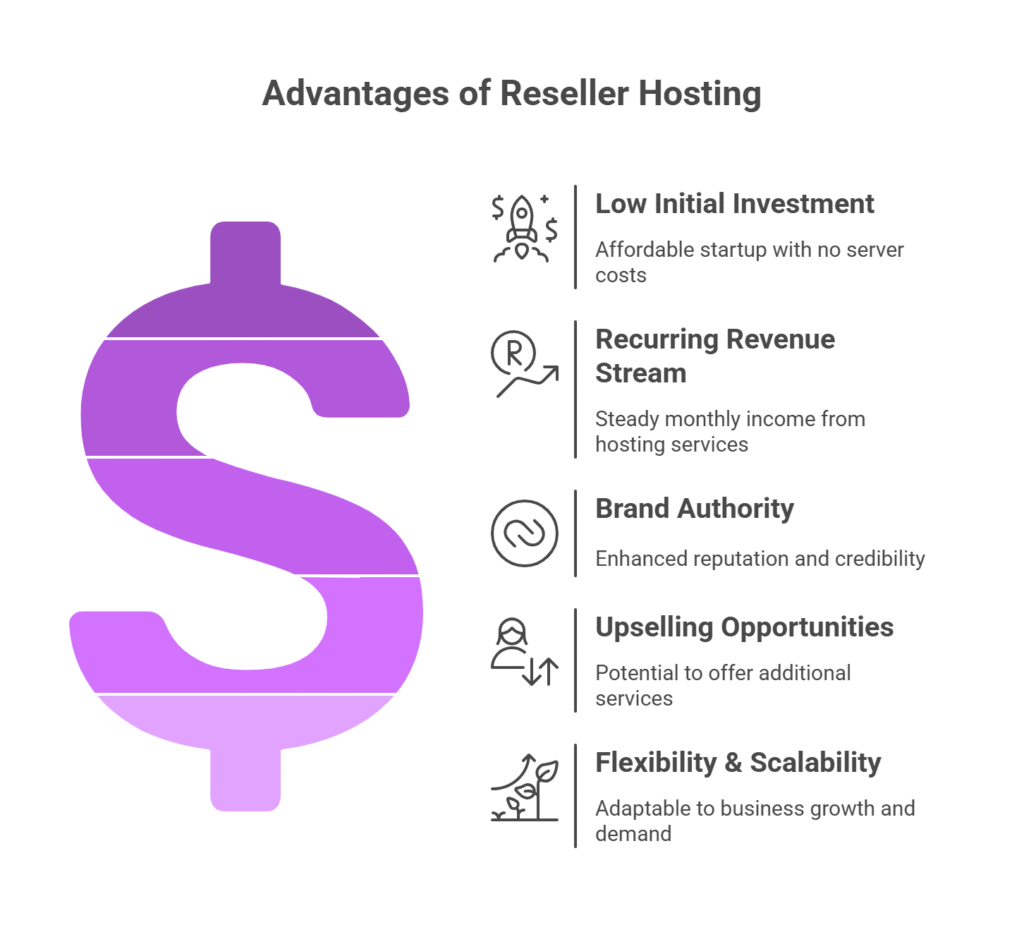
Benefits of Reseller Hosting
- Low Initial Investment: Reseller hosting is an affordable way to start a hosting business because you don’t need to purchase expensive physical servers or invest in maintaining a data center. Your hosting provider handles all the technical infrastructure, allowing you to focus on building your business without major upfront costs.
- Recurring Revenue Stream: By offering hosting services to clients, you can earn steady monthly income. Since hosting is a continuous need, this creates a predictable and reliable revenue stream, providing financial stability as your client base grows.
- Brand Authority: Reseller hosting allows you to sell hosting services under your own brand name. This boosts your reputation as a trusted provider and enhances your credibility in the market, helping you attract and retain more clients.
- Upselling Opportunities: Reseller hosting opens the door to offering additional services, such as website design, SEO, social media management, or digital marketing. By bundling these services with hosting plans, you can provide an all-in-one solution that meets multiple client needs, increasing your revenue potential.
- Flexibility & Scalability: Reseller hosting is highly adaptable to your business growth. You can start with a smaller plan that fits your budget and client base, then easily upgrade as demand increases. This scalability ensures you can grow your business without worrying about outgrowing your hosting capacity.
Challenges of Reseller Hosting and How to Overcome Them
While the reseller hosting business model offers many advantages, it also comes with its share of challenges. However, with the right strategies and preparation, you can navigate them effectively. Here’s a breakdown of common obstacles in reseller hosting and how to overcome them:
1. Limited Server Control and Workaround Solutions
As a reseller hosting provider, you typically don’t have root access to the servers, which limits your ability to customize configurations. This can be frustrating when clients request specific server-side features that go beyond the standard offerings.
- How to overcome it: Work with a reseller hosting provider that offers flexible reseller plans and a variety of customization options. Look for providers with strong support teams that act as an extension of your service, helping you troubleshoot technical issues quickly and provide solutions to your clients.
2. Dependency on Upstream Providers (Risk Mitigation)
Your reseller hosting business relies heavily on the performance and reliability of your primary hosting provider. Any downtime, slow service, or security issues on their end will directly impact your clients and, consequently, your brand reputation.
- How to overcome it: Choose an upstream hosting provider with a proven track record of reliability, high uptime (99.9% or better), and robust customer support. It’s also wise to diversify by offering hosting services from more than one provider, reducing reliance on a single source.
3. Technical Knowledge Requirements and Learning Resources
Reseller hosting requires a certain level of technical expertise. Beginners may struggle with server configurations, troubleshooting, or managing hosting environments.
- How to overcome it: Invest time in learning the basics of web hosting and server management. There are plenty of online resources, tutorials, and community forums to help you build your skills. Additionally, partner with a reseller hosting provider that offers strong technical support and educational resources to assist you along the way.
4. Customer Support Demands and Management Strategies
As your client base grows in your reseller hosting business, so will the volume of support requests. Managing customer issues efficiently is critical for maintaining client satisfaction and your brand’s reputation as a reliable hosting provider.
- How to overcome it: Implement a ticketing system to streamline and organize customer service. If managing support becomes overwhelming, consider outsourcing to a third-party support team that specializes in web hosting. Clear communication and fast resolution times will keep your clients happy.
5. Market Competition Analysis and Differentiation
The web hosting market is highly competitive, with many resellers and large hosting companies vying for customers. Standing out in this crowded space can be challenging for a new reseller hosting business.
- How to overcome it: Focus on a niche to differentiate yourself. For example, specialize in WordPress hosting, eCommerce hosting, or hosting services tailored to specific industries. Build a strong brand, offer unique features, and provide exceptional customer service to attract and retain clients, solidifying your position as the best reseller hosting provider for your target audience.
6. Legal and Compliance Responsibilities
As a reseller, you are responsible for ensuring that your hosting services comply with legal and regulatory requirements, such as GDPR or data protection laws. Failing to address these responsibilities can lead to significant legal issues for your reseller hosting business.
- How to overcome it: Familiarize yourself with the relevant laws and regulations in your region. Work with a hosting provider that prioritizes compliance and security, and ensure your terms of service and privacy policies are clear and up to date. Consulting with a legal professional can help you avoid potential pitfalls.
By understanding these challenges and taking proactive steps to address them, you can build a successful reseller hosting business that delivers value to your clients while staying competitive in the web hosting market.
Who Should Consider Reseller Hosting?
Reseller hosting presents an excellent opportunity for a variety of professionals and businesses looking to expand their service offerings or establish a scalable online revenue model. Here’s a closer look at who should consider leveraging this hosting business model:
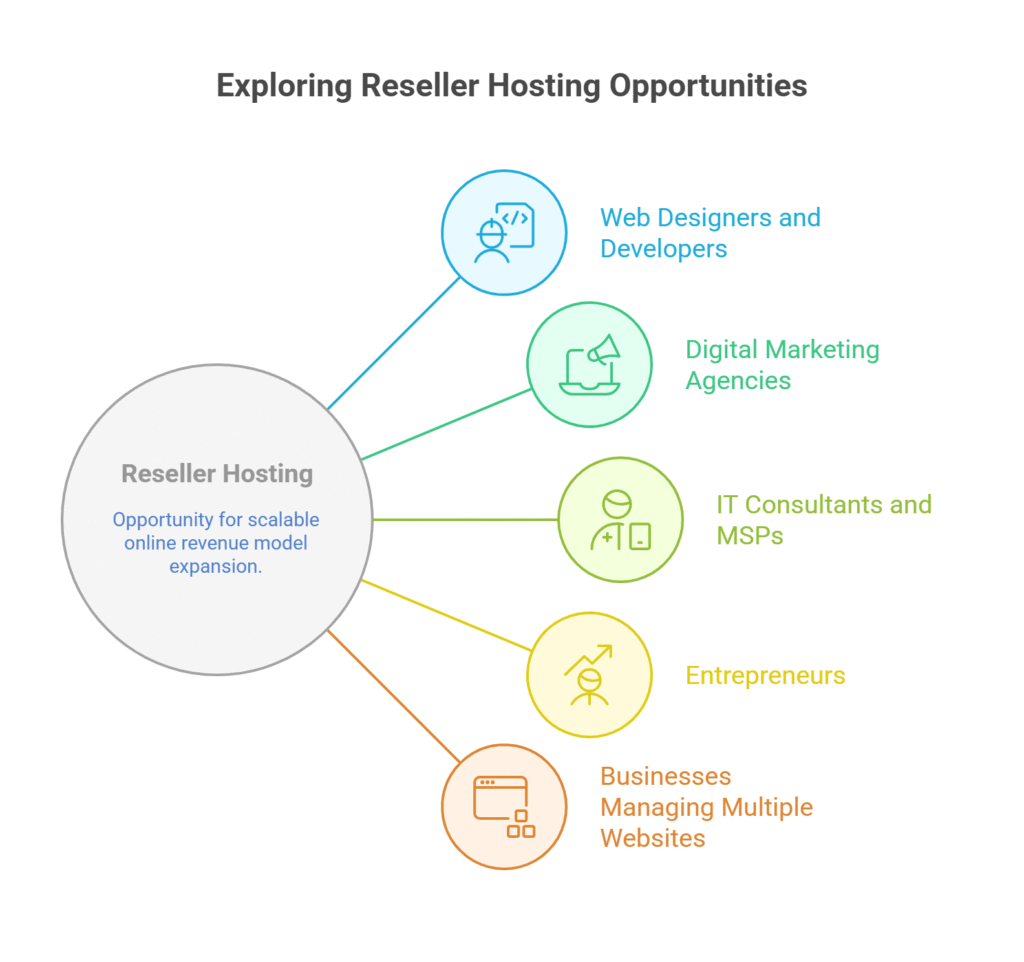
- Web Designers and Developers (Integration with Existing Services): For web design and development professionals, reseller hosting allows seamless integration of hosting services into their existing offerings. By bundling hosting with design and development, professionals can provide end-to-end solutions, maintain control over hosting environments, and create a streamlined experience for their clients.
- Digital Marketing Agencies (Complete Package Offerings): Agencies focused on digital marketing can enhance their value by including reseller hosting in their service portfolio. Offering hosting alongside website optimization, SEO services, and digital campaigns ensures that clients receive a comprehensive package, increasing client satisfaction and fostering long-term relationships.
- IT Consultants and Managed Service Providers: IT consultants and MSPs can benefit from reseller hosting by managing client hosting needs alongside other IT operations. This enhances their ability to offer full-service support, ensuring their clients’ websites and applications are reliable, secure, and well-maintained.
- Entrepreneurs Seeking Scalable Online Businesses: Reseller hosting is an ideal model for entrepreneurs aiming to enter the online business space. Its scalability allows entrepreneurs to grow their client base without significant upfront investments in infrastructure, making it a cost-effective way to build a sustainable hosting business.
- Existing Businesses Managing Multiple Client Websites: Businesses that manage multiple websites for clients—such as marketing firms or creative agencies—can use reseller hosting to centralize management. This approach simplifies operations, reduces overhead, and allows for tailored hosting solutions for each client.
Comparison with Affiliate Marketing and Direct Hosting
Reseller hosting is a far better option than affiliate marketing when it comes to control and earning potential. Affiliate marketing lets you earn a small commission by promoting another hosting provider’s services. Reseller hosting, on the other hand, allows you to build your own brand. It also gives you the opportunity to generate recurring revenue.
With reseller hosting, you control pricing, packaging, and customer relationships, which allows for higher profits and greater flexibility. Unlike affiliate marketing, where you’re dependent on the hosting provider’s performance and payouts, reseller hosting puts you in the driver’s seat, enabling you to grow your hosting business on your terms. For those seeking a more sustainable and customizable business model, reseller hosting is the smarter choice.
Choosing the Right Reseller Hosting Provider
Choosing the right reseller hosting company can make or break your business. The features you select will directly impact your ability to serve your clients effectively and grow your brand. Here are the key features you need to consider when looking for the best reseller hosting provider:
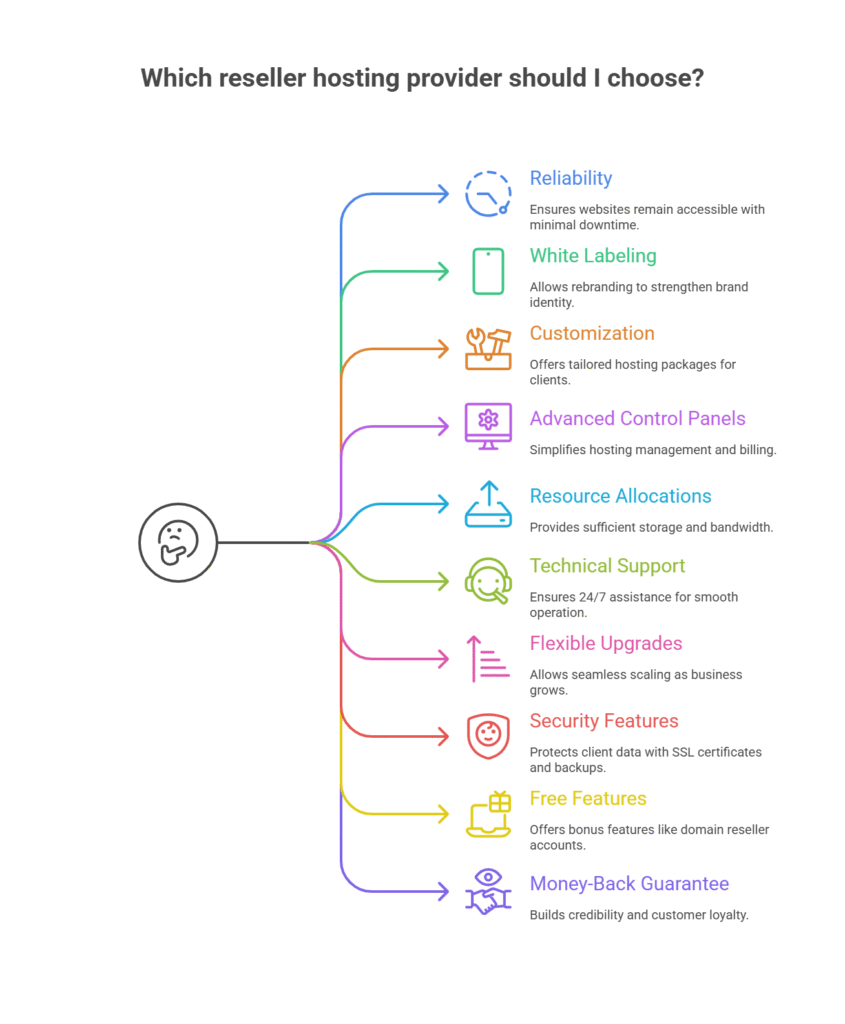
- Reliability (Uptime Guarantee): A dependable hosting provider ensures that websites remain accessible and functional without interruptions, which is critical for businesses relying on their online presence. High uptime guarantees, such as 99.9%, mean minimal downtime.
- White Labeling Options: This feature lets you rebrand the hosting services as your own, meaning your clients won’t see the original hosting provider’s name anywhere. Instead, everything will appear under your hosting business name, helping you create a seamless and professional experience that strengthens your brand identity with white label hosting options.
- Customization Options: A good reseller hosting plan allows you to customize hosting packages for your clients, including server resources like storage, bandwidth, and email accounts, to suit their individual needs.
- Advanced Control Panels (e.g., WHMCS): Tools like WHMCS (Web Host Manager Complete Solution) and WHM (Web Host Manager) are designed to make managing web hosting services easier for both businesses and their clients. With WHMCS, you can automate recurring tasks such as billing and invoicing, reducing manual work and ensuring timely payments. It also allows you to efficiently manage client accounts, track services, and provide a seamless experience.
- Resource Allocations: Make sure your hosting provider offers adequate resources such as disk space, bandwidth, RAM, and CPU power to support your needs as you serve multiple clients. Sufficient disk space ensures you can store all necessary files, while ample bandwidth allows smooth data transfer.
- 24/7 Technical Support: Reliable technical support from your reseller hosting provider is essential for smooth operation. Choosing a provider that offers 24/7 assistance ensures that both you and your clients can address issues as soon as they arise, minimizing downtime and disruptions.
- Flexible Upgrades for Growing Businesses: As your hosting business grows and attracts more clients, your website demands will increase. A good hosting provider should offer easy and flexible upgrade options, allowing you to scale your reseller hosting plan seamlessly as your business success continues to grow.
- Security Features (SSL Certificates, Backups): Security is essential. Make sure your reseller hosting provider offers SSL certificates, which encrypt and protect your clients’ sensitive data. Regular backups are also crucial. Opting for a provider that offers unlimited SSL certificates is even better.
- Free Features (e.g., Domain Reseller Accounts): Some providers include bonus features like domain reseller accounts. These accounts let you sell domain names directly to your clients, providing an opportunity to expand your revenue streams.
- Money-Back Guarantee: When choosing reseller hosting, it’s important to check if your hosting provider offers a money-back guarantee. This reflects confidence in the provider’s services and helps build credibility and customer loyalty.
Pro Tip: Why not check out our reseller hosting packages at SkyNetHosting.net? We offer everything you need to start your own web hosting company, including robust features, reliable services, and competitive pricing to help you succeed in the hosting industry.
Step-by-Step Guide to Setting Up Your Reseller Hosting Business
Setting up a reseller hosting business can seem complex, but by following these steps, you’ll be well-equipped to launch and grow your venture successfully. Below is a clear, actionable guide to help you through the process of how to set up reseller hosting:
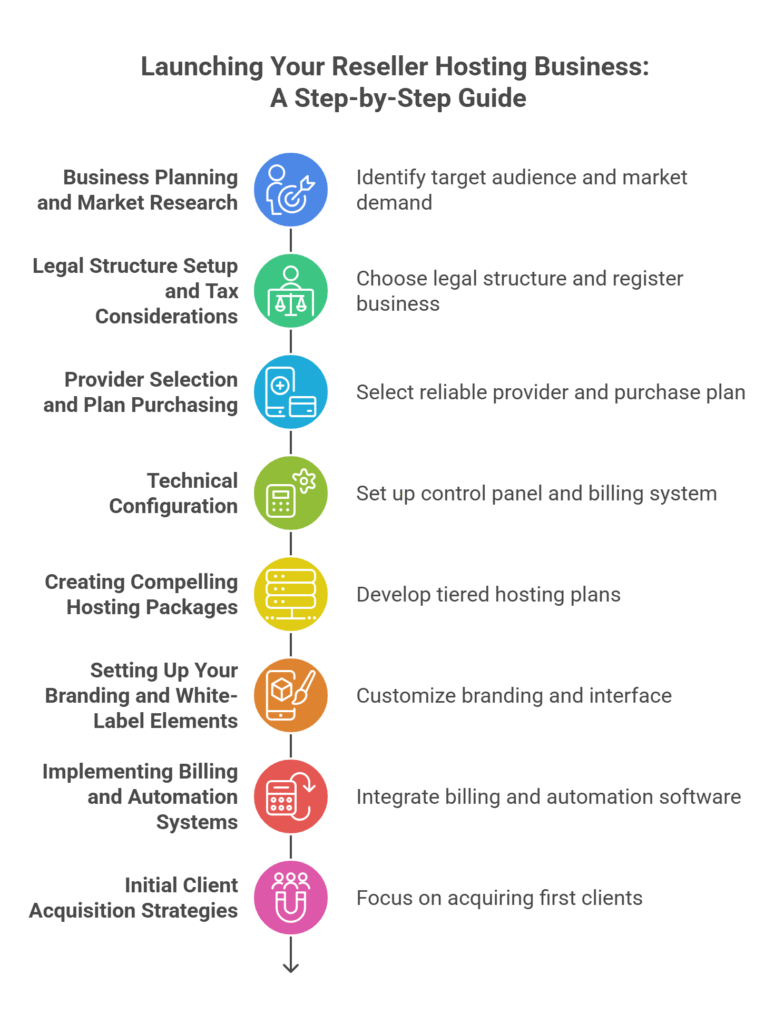
- Step 1: Business Planning and Market Research: Start by identifying your target audience and assessing market demand in your niche. Conduct competitor research to understand pricing, hosting services, and unique opportunities you can leverage. A detailed business plan will help you outline your goals, operational structure, and financial projections for your reseller hosting business.
- Step 2: Legal Structure Setup and Tax Considerations: Choose a legal structure for your hosting business, such as a sole proprietorship, partnership, or limited liability company (LLC), based on your operational and liability needs. Register your business name and ensure you meet all tax obligations by consulting with a legal or tax professional.
- Step 3: Provider Selection and Plan Purchasing: Select a reliable reseller hosting provider that fits your budget and offers robust features like ample bandwidth, uptime guarantees, scalability options, and white-labeling capabilities. Evaluate their pricing structures and purchase a reseller hosting plan that aligns with your anticipated customer base and growth projections.
- Step 4: Technical Configuration: Once you’ve purchased your reseller plan, configure the technical aspects of your hosting environment. This involves setting up your control panel (e.g., WHM or cPanel), billing system (like WHMCS or Blesta), DNS settings, and other critical elements. Ensure all technical configurations follow security best practices and are optimized for your customer’s experience.
- Step 5: Creating Compelling Hosting Packages: Develop hosting packages tailored to your target audience. Consider features such as disk space, data transfer limits, SSL certificates, and backup options. Offering tiered plans (e.g., basic, standard, premium) can help you cater to diverse customer needs and budgets, making your reseller hosting business more attractive.
- Step 6: Setting Up Your Branding and White-Label Elements: To make your reseller hosting business truly yours, customize the branding aspects. This includes logos, colors, and setting up a white-label interface that removes your provider’s branding. This creates a professional appearance and builds trust with your clients.
- Step 7: Implementing Billing and Automation Systems: Simplify your operations by integrating billing and automation software like WHMCS or Blesta to handle client invoicing, payment processing, and support tickets. These tools streamline account management and provide a seamless experience for both you and your customers in your reseller hosting venture.
- Step 8: Initial Client Acquisition Strategies: Finally, focus on acquiring your first clients. Leverage digital marketing tactics such as creating a professional website, running social media ads, and utilizing search engine optimization (SEO) for reseller hosting keywords. Consider offering introductory discounts or promotions to attract early adopters and encourage word-of-mouth referrals.
By following these steps, you’ll have a strong foundation for your reseller hosting business, allowing you to scale and achieve lasting success.
Pricing Strategies for Maximum Profitability in Reseller Hosting
When setting up your reseller hosting business, it’s crucial to establish a pricing strategy that balances profitability while remaining affordable for your clients. Implementing effective pricing strategies is essential for maximizing profitability in your reseller hosting business. Below are key approaches to consider:
- Market-Based Pricing Analysis: Conduct thorough research into competitors’ pricing structures to ensure your reseller hosting offerings are competitively positioned while maintaining profitability.
- Cost-Plus Pricing Calculations: Calculate your costs, including server fees, software licensing (we are providing Free WHMCS), and operational expenses, and add a suitable margin to determine your minimum viable pricing for your hosting packages.
- Value-Based Pricing for Specialized Markets: For niche markets or premium reseller hosting services, utilize value-based pricing to reflect the unique benefits and expertise you provide, allowing for higher revenue potential.
- Package Tiering Strategies: Design tiered hosting packages that cater to various customer needs and budgets, enabling you to effectively target different market segments while maximizing sales opportunities within your reseller hosting business.
- Upselling and Cross-Selling Opportunities: Leverage upselling and cross-selling techniques to encourage clients to purchase higher-tier plans or additional services, increasing overall customer lifetime value in your reseller hosting client base.
- Promotional Pricing Strategies and Their Impact: Use limited-time discounts, introductory rates, or bundled deals strategically to attract new customers while balancing long-term profitability for your reseller hosting business.
- Long-Term Contract Incentives: Offer discounts or added benefits for clients who commit to extended contracts, helping to secure predictable revenue streams and build client loyalty for your reseller hosting services.
By employing these pricing strategies, you can optimize your revenue while ensuring alignment with customer expectations and market demand for your reseller hosting services.
Marketing Your Reseller Hosting Business
Once you’ve set up your reseller hosting and determined your pricing, it’s crucial to market your web hosting business to land your first client. These are the winning strategies our clients use to succeed in their web hosting business journey:
- Target Audience Identification and Persona Development: Define your ideal customers by understanding their specific needs, challenges, and demographics. Create detailed buyer personas to guide your marketing efforts toward addressing their pain points effectively for your reseller hosting services.
- Unique Selling Proposition (USP) Crafting: Differentiate your reseller hosting services from competitors by identifying and emphasizing unique features or benefits, such as superior customer support, enhanced security options, or specialized hosting solutions.
- Content Marketing Strategies Specific to Hosting: Publish relevant and educational content such as blogs, tutorials, and webinars that address common hosting questions, trends, and technical guides. Demonstrating expertise can position your brand as a trusted authority in the reseller hosting industry.
- SEO Optimization for Hosting-Related Keywords: Conduct keyword research to identify high-traffic terms related to reseller hosting. Optimize your website content, product descriptions, and blogs to rank well in search engines, driving organic traffic and increasing visibility for your web hosting business.
- Social Proof Gathering and Testimonial Leveraging: Encourage satisfied customers to share reviews and testimonials about your hosting services. Display this social proof prominently on your site and promotional materials to build credibility and trust in your reseller hosting brand.
- Partnership and Affiliate Program Development: Establish partnerships with complementary businesses and create affiliate programs to expand your reach. These initiatives incentivize partners to promote your reseller hosting services in exchange for commissions or other benefits.
- Email Marketing Sequences for Conversion: Use email campaigns to nurture leads and retain existing customers. Develop sequences with tailored content for each stage of the customer lifecycle, from initial inquiries to upselling additional reseller hosting services.
By implementing these marketing strategies, you can strengthen your presence in the reseller hosting market, attract the right customers, and achieve long-term business growth.
Scaling Your Reseller Hosting Business
Starting and growing a reseller hosting business can be an exciting venture, but scaling it to new heights is where the real challenge lies. Success depends on understanding the market, optimizing your offerings, and making smart, strategic decisions. Scaling a reseller hosting business requires strategic planning and well-timed decisions. Below are some key considerations to guide your expansion:
- When and How to Upgrade Your Reseller Plans: Monitor resource usage and customer demand to identify when your current reseller plan limits growth. Upgrade to higher-tier plans that offer additional storage, bandwidth, and features to accommodate your growing customer base.
- Hiring Considerations for Technical and Support Teams: As your reseller hosting business grows, timely hiring of skilled technical and customer support staff is crucial. Focus on team members who can provide reliable support, maintain server performance, and ensure customer satisfaction.
- Process Documentation and Standard Operating Procedures: Develop and maintain clear process documentation and standard operating procedures (SOPs). This ensures efficiency, consistency, and scalability when onboarding new team members or managing routine tasks in your reseller hosting operations.
- Business Automation Implementation: Leverage automation tools to streamline operations, such as billing systems, customer inquiries, and server maintenance tasks. Automation minimizes manual intervention, saving time and reducing errors in your reseller hosting business.
- Expanding Service Offerings Strategically: Introduce complementary services, such as website design, SEO optimization, or managed hosting, to provide added value to your customers and boost revenue streams for your reseller hosting company.
- Acquisition Opportunities in the Hosting Space: Explore opportunities to acquire smaller reseller hosting businesses or merge with complementary companies. This accelerates growth and helps you expand your customer base and service portfolio.
- Exit Planning and Business Valuation Factors: If you plan to sell your reseller hosting business in the future, develop a solid exit strategy. Focus on increasing customer retention, growing recurring revenue, and maintaining detailed financial records to maximize your business valuation. Prepare to present tangible growth potential to potential buyers.
By addressing these areas, you can effectively scale your reseller hosting business while maintaining operational efficiency and a competitive edge in the market.
The Future of Reseller Hosting in 2025 and Beyond
The web hosting market is on the brink of an exciting transformation, driven by groundbreaking trends set to redefine how businesses operate online. Here’s a glimpse into the future of reseller hosting:
- Cloud Reseller Hosting 2.0: Imagine limitless scalability and flexibility as businesses seamlessly grow with their clients’ needs. The next generation of cloud reseller hosting promises unparalleled performance and and reliability, making it easier than ever to manage resources efficiently.
- AI-Powered Hosting Revolution: Artificial intelligence is going beyond automation to predict, optimize, and enhance every aspect of hosting. From self-managing servers to AI-driven support, the future is all about smarter, faster, and more efficient operations in the reseller hosting industry.
- Next-Level Cybersecurity: With cyber threats evolving, the future of hosting will prioritize ironclad protection. Advanced cybersecurity tools will proactively defend against threats, ensuring data and websites remain secure in an increasingly digital world.
These trends are just the beginning. Reseller hosting is becoming a gateway to the future of online business, offering incredible opportunities for entrepreneurs to deliver cutting-edge services and stay ahead in a rapidly changing market. The future of hosting is here—are you ready to embrace it?
What is Next? Start Your Reseller Hosting Journey Today!
Reseller hosting is one of the most accessible and flexible ways to step into the rapidly expanding online business ecosystem. It allows entrepreneurs to purchase hosting space in bulk and resell it to individual clients, creating a scalable and profitable business model.
As demand for online services continues to grow with businesses increasingly relying on digital presence, reseller hosting provides a low-cost entry point for those looking to capitalize on this trend.
When it comes to reseller hosting, SkyNetHosting.net stands out as the best choice for aspiring entrepreneurs. Offering unmatched features, including robust security, 24/7 support, and flexible scalability, SkyNetHosting.net empowers businesses to build a reliable and profitable hosting venture.
With affordable pricing plans, intuitive management tools, a free WHMCS license, and a proven track record of customer satisfaction, SkyNetHosting.net ensures you have everything needed to excel in reseller hosting. Plus, offer customer and sales support to your clients with ease. Make the smart choice, start your reseller hosting business with SkyNetHosting.net today.
Why not try our reseller hosting packages and see the difference for yourself?
FAQ about What is Reseller Hosting
What exactly is reseller hosting?
Reseller hosting is a service where you buy hosting resources (like disk space, bandwidth) from a larger hosting provider in bulk and then resell them to your own clients under your own brand name. It allows you to start a hosting business without owning or maintaining servers.
How does white label hosting relate to reseller hosting?
White label hosting is a key feature of reseller hosting that allows you to brand the services as your own. This means your clients will see your company’s name, logo, and branding, not that of the original hosting provider, creating a seamless experience.
Is reseller hosting profitable?
Yes, reseller hosting can be highly profitable due to its low initial investment and recurring revenue model. By purchasing resources at wholesale prices and marking them up, you can achieve significant profit margins, especially as your client base grows.
What tools are typically included with a reseller hosting plan?
Most reseller hosting plans include powerful control panels like WHM (Web Host Manager) for managing client accounts, and often billing software like WHMCS (Web Host Manager Complete Solution) for automating invoicing and support, making it easier to run your hosting business.
What are the main challenges of running a reseller hosting business?
Common challenges include limited server control (as you don’t have root access), dependency on your upstream hosting provider’s reliability, the need for some technical knowledge, and managing customer support demands. However, these can be overcome with proper planning and choosing a reliable provider.
Who should consider starting a reseller hosting business?
Reseller hosting is ideal for web designers, developers, digital marketing agencies, IT consultants, entrepreneurs seeking scalable online ventures, and existing businesses managing multiple client websites who want to expand their service offerings and generate recurring revenue.
How can I choose the best reseller hosting provider?
When choosing the best reseller hosting provider, look for high uptime guarantees, white-label hosting options, flexible resource allocation, 24/7 technical support, security features (SSL, backups), flexible upgrade options, and competitive pricing with a money-back guarantee.

